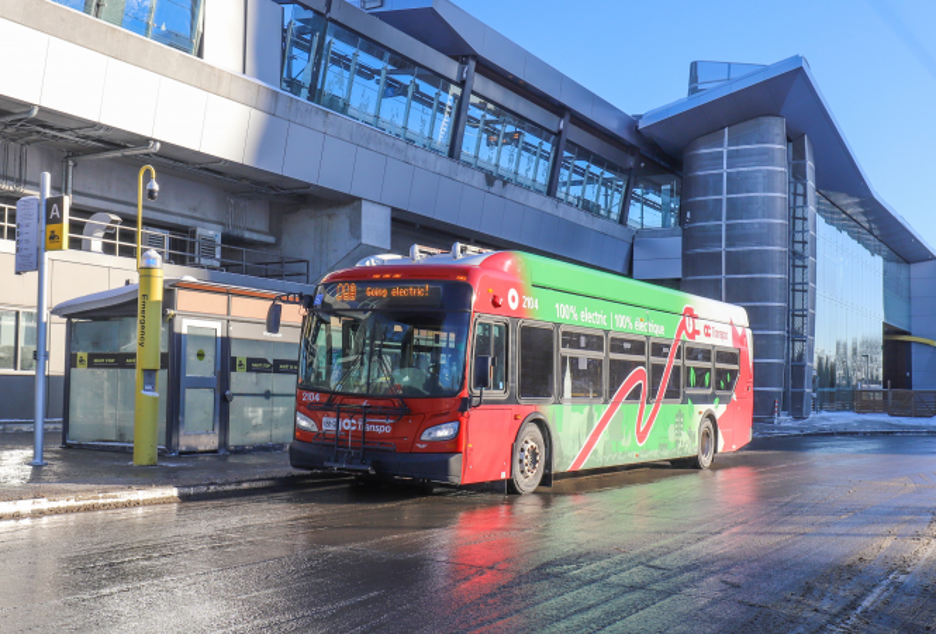Its sample size is small, but an OC Transpo report on the performance of electric buses over the past two years paints a promising picture.
There are four e-buses in Ottawa’s 750-vehicle fleet. The New Flyer XE40s were put into rotation in February 2022. In two years, the quartet has saved some 50,000 litres of diesel fuel, each, according to a report tabled at a recent Transit Commission meeting.
Now approaching 500,000 kilometres on the road, the buses have met or exceeded performance capacbilities and regularly last 200 km on a full charge.
“The potential for full electrification is there,” said Dan Rutabingwa, climate campaigner for environmental group Ecology Ottawa.
“The cost savings on diesel are the quickest savings that will be felt,” Rutabingwa said in an email to Capital Current. “But these impacts will be greater if the buses are accessible, affordable and equitable.”
OC Transpo wants to have a fully electric fleet of both 40- and 60-foot buses by 2036.
Rutabingwa applauded the savings on diesel fuel and emissions, but emphasized that electrifying transit in Ottawa doesn’t fix all of OC Transpo’s woes. He encouraged the city to accelerate the rollout of the zero emission vehicles and to focus on accessibility to increase ridership.
“We need everyone to buy into public transit; which means incentives, lower fares and more accessible routes,” he said.
OC Transpo’s general manager, Renée Amilcar, says the city is struggling to expand its fleet — particularly with articulated buses.
‘As councillors, we’re all anxious to see more electric buses hitting the road as soon as possible. In a perfect world, if we could convert all of our hundreds of buses to electric tomorrow, that would be amazing.”
— Stittsville Coun. Glen Gower, chair, Transit Commission
“As councillors, we’re all anxious to see more electric buses hitting the road as soon as possible,” said Coun. Glen Gower, Transit Commission chair. “In a perfect world, if we could convert all of our hundreds of buses to electric tomorrow, that would be amazing.”
Gower said that the city’s rollout of e-buses signal the challenges of supply and procurement.
“We’re making sure that the buses that we’re ordering meet our requirements here in Ottawa for transit.”
Gower said that although the plan is a fully electric fleet, the value of public transit — even if the vast majority of buses are powered by fossil fuels — is “far more” environmentally friendly than having all potential riders commuting in single-occupant vehicles.
Sam Hersh, coordinator of the grassroots municipal watchdog group Horizon Ottawa, said he supports electrification of buses but adds that it won’t solve the climate crisis.
The City of Ottawa officially declared a climate emergency in April 2019, and moved to develop policies to reduce greenhouse gas emissions.
Hersh also pointed to the fact that having more riders on diesel-powered buses is still going to have a greater impact on emissions compared to riders getting around in a car.
“We need to invest in expanding our fleet in general and investing in road infrastructure that facilitates better public transit and higher transit use,” said Hersh. “But we also have to talk about the affordability of the system.”
For Hersh, improving accessibility and decreasing emissions can be dealt with by lowering the cost of public transit: “If it costs less to take the bus, more people will take the bus.”
A single adult fare on OC Transpo now costs $3.80 or $3.85 if paid in cash, up 10 cents from 2023, and an adult monthly pass costs $128.75 per month, up 2.5 per cent from 2023.
“If we continue to endlessly raise transit fares, it’s obviously going to be less appealing for folks to take,” said Hersh.
More electric buses will arrive in the last few months of 2024, bringing the total to 30, with 76 more expected in 2025.
Of the 26 e-buses coming this year, four are being produced by Quebec-based NOVA, and 22 are coming from Winnipeg-based New Flyer.




